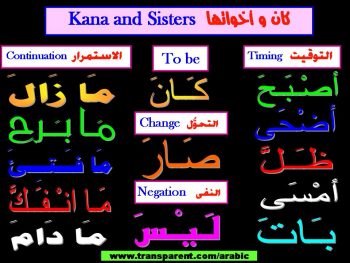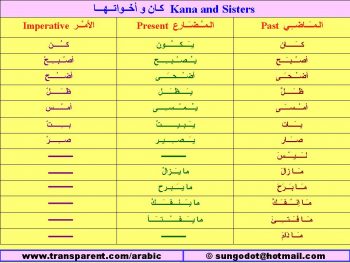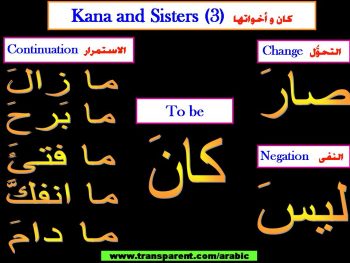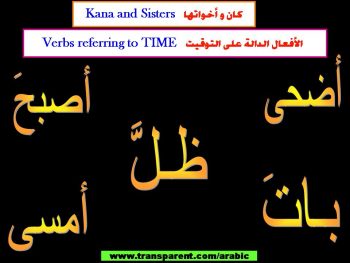Tag Archives: Kana and Sisters
The Predicate of Kana and Sisters Posted by Fisal on Mar 17, 2012
We have already known that the Nominal Sentence الــجــمـــلـة الاسـمــيــــة consists of two parts; the Mubtada الـمـبـتــدأ and the Khabar الـخــبـر . Both the Mubtada and the Khabar have different types. We have also known that the verb Kana كان and its sisters can begin the nominal sentence and thus the Mubtada becomes the noun…
Kana and Sisters; Verb Types Posted by Fisal on Feb 17, 2012
The verb Kana كان and its sisters are special verbs in the Arabic language. They start the Nominal sentence and case the subject to be their noun (Ism اســـْـــم) with a dammah and cause the predicate to be their Predicate (Khabar خـــَــبـــَــر) with a Fat’ha on its end. Now the question is what are…
Reading Comprehension Exercise Posted by Fisal on Jan 21, 2012
* اقرأ القطعة التالية و أجب عن الأسئلة Read the following passage and answer the questions بدأ العام الدراسى الجديد , و فرح التلاميذُ كثيراً بذهابهم إلى المدرسة و مقابلة زملاءهم . و دخل المُدرسُّ الفصلَ مبتسماً , و كان مسروراً بنظام التلاميذ و حماسهم , و قال لهم : ” اجتهدوا فالعلمُ أساسُ التقدم…
Kana and Sisters (Part 3) Posted by Fisal on Jan 20, 2012
Kana and Sisters (Part 3) كانَ و أخواتها Kana and its sisters are special verbs in the Arabic Grammar. These verbs come at the beginning of the nominative sentence. The Mubtada of the nominative sentence becomes the noun subject (Ism) of Kana and sisters wheareas the Khabar becomes the Khabar of Kana and sisters…
Kana and Sisters (Part 2) Posted by Fisal on Jan 18, 2012
Now that we have learnt the verb Kana and its sisters, we should all ask: What do these verbs mean? What do they refer to? What are they used for? In today’s post, we will try to answer these Questions. We will look at these verbs in different categories according to their use…
Kana and Sisters (1) Posted by Fisal on Jan 16, 2012
Kana and Sisters (1) كان و أخواتها The Nominal sentence consists of two parts; the subject (Mubtada) and the predicate (Khabar). Both parts of the nominal sentence are always in the Nominative (Marfo’) Case حالة الرفع . The Nominative Case means that the noun often has a Dammah or a Damm Tanween on its ending. Today…








